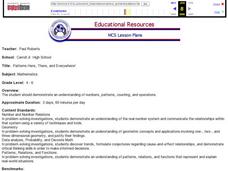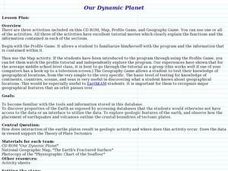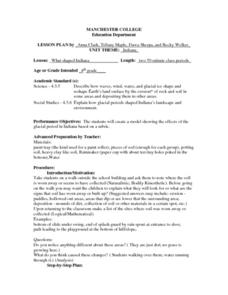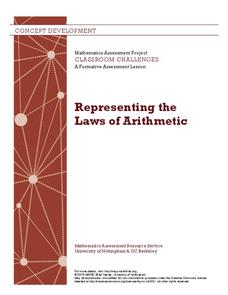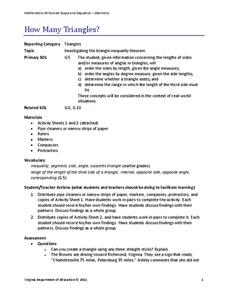Curated OER
Investigation - Adrienne's Pattern Block Angles
Fifth graders investigate possible solutions to a word problem. They explore properties of polygons and right angles. Students demonstrate proper angle measurement. Students discover patterns.
Curated OER
Discovering Ohm's Law
Connect math with science! Pupils apply properties of Ohms Law as they solve problems and identify the inverse relationship of a function. They analyze the shape of the graph of an inverse function and use it to make predictions.
Curated OER
Finding the Area and Perimeter of Polygons
Seventh graders practice finding the area and perimeter of polygons. In this polygon area instructional activity, 7th graders brainstorm shapes and take a walk to locate shapes. Students record properties of shapes and use...
Curated OER
Patterns Here, There and Everywhere
Pattern recognition is a skill often used in mathematics. Learners count and sort manipulatives, organize the data into a graph and answer questions about the information displayed. They collect the objects to be used and create patterns...
Curated OER
American Journeys: Right Place, Right Time
Sixth graders measure distances on a map using string and a ruler. They complete mathematical word problems about measurement.
Curated OER
Angles - Unlocking Geometry
Students investigate the concept of angles and how they are used in geometry. They construct polygons using various types of angles and then classify them according to their physical properties. Students use a computer program in order...
Curated OER
The Laws of Sines and Cosines Made Simple!
Students study the law of sine and cosine. For this pre-calculus lesson, students create a triangle and identify the different ratios of a non-right triangle. They use the properties of sine and cosine to solve.
Illustrative Mathematics
Making Cookies
Hooray for chocolate chip cookies! Ask your mathematicians to triple a chocolate chip cookie recipe and then reduce the recipe by one-fourth. Your class may need two days to complete, tripling the recipe the first day and reducing the...
Curated OER
Phases of Matter
Eighth graders practice using correct vocabulary and apply content knowledge related to phases of matter when answering questions about situations or observations from everyday life.
Curated OER
Density of Minerals
Students determine the mass, volume, and density of two different mineral samples. Students show data and calculations as well as answer questions about the mineral identities.
Curated OER
Factors That Shaped Indiana
Fourth graders construct a model of Indiana which displays the effects of the glacial period on the state's physical structure. Students work in groups to plan and execute their model based on an established rubric.
Curated OER
Properties of Triangles
Students explore the relationship between how big a side of a triangle is and how big its opposite angle is by creating triangles using an interactive website.
Curated OER
Ocean Currents
Students label the names, relative temperature, distribution, and direction of flow of major ocean currents on a world map. They also explore and model the natural forces that affect the movement of ocean currents through demonstrations...
Curated OER
Mathematics of Ornaments and Architecture
Young scholars study African traditional architecture. They examine how African ornaments, wall painting and motifs use geometric shapes to express and explain the culture.
They discuss the ornaments and architectural designs in the...
Curated OER
Applications of Properties of Quadrilaterals in the Coordinate Plane
High schoolers explore the concept of quadrilaterals. In this quadrilaterals lesson, students use the slope formula, midpoint formula, and distance formula to justify that a given quadrilateral is a parallelogram.
Mathematics Assessment Project
Solving Linear Equations
Linear equations are the focus of activities that ask learners to first complete a task that involves interpreting algebraic expressions and solving linear equations. They then take part in a card activity matching...
Mathematics Assessment Project
Representing the Laws of Arithmetic
Sixth graders connect numerical expressions to geometric area. They first complete an assessment task requiring them to identify area models for numerical expressions. Learners then participate in an activity to match area models to...
Mathematics Assessment Project
Deducting Relationships: Floodlight Shadows
Try to figure out what happens with shadows as a person moves between two light sources. A formative assessment lesson has individuals work on an assessment task based on similar triangles, then groups them based on their...
Arizona Department of Education
Introduction to Integers
Welcome to the backward world of negative numbers. This introductory lesson teaches young mathematicians that negative numbers are simply the opposite of positive numbers as they use number lines to plot and compare...
Curated OER
Exponent Rules
Pupils use calculators to work independently to discover the rules for working with exponents. The lesson requires the use of a TI-nspire handheld and software.
Virginia Department of Education
How Many Triangles?
Something for young mathematicians to remember: the sum of any two sides must be greater than the third. Class members investigates the Triangle Inequality Theorem to find the relationship between the sides of a triangle. At the...
EngageNY
Curves from Geometry
Escape to investigate hyperbolas. Pupils take a look at what happens to the elliptical orbital path of a satellite that exceeds escape velocity as the opener to the eighth lesson in a unit of 23. Scholars analyze basic hyperbolas and how...
EngageNY
Conditions for a Unique Triangle—Two Angles and a Given Side
Using patty paper, classes determine that only one triangle is possible when given two specific angle measures and a side length. As the 10th instructional activity in the series of 29, young math scholars add these criteria to those...
EngageNY
Collecting Rational Number Like Terms
Teach pupils to handle fractions fluently. The sixth installment in the series of 28 has class members apply the concepts learned in previous lessons to expressions with fractional coefficients. The fractions are both mixed numbers and...



